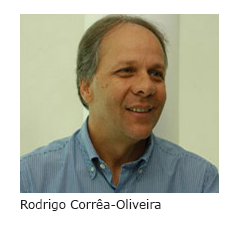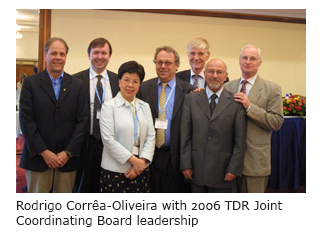 It was a TDR grant that launched Professor Rodrigo Corrêa-Oliveira on an impressive life-long career in immunology. And not just him; at least three-quarters of Brazil's immunologists have benefited from TDR support during their careers. “Very rarely do you meet someone who didn’t get money from TDR for their research,” he says.
It was a TDR grant that launched Professor Rodrigo Corrêa-Oliveira on an impressive life-long career in immunology. And not just him; at least three-quarters of Brazil's immunologists have benefited from TDR support during their careers. “Very rarely do you meet someone who didn’t get money from TDR for their research,” he says.
For Corrêa-Oliveira, at a time when immunology was a new field of study in Brazil, funding meant unthinkable opportunities; a PhD at the US Johns Hopkins University working under the eminent US scientist Alan Sher on a disease that was prevalent in Brazil, schistosomiasis. That opportunity led to work at the National Institutes for Health (NIH).
Rodrigo has not only the ability to groom and develop young scientists, but also to launch cutting edge translational research initiatives, including the clinical field testing of antihelminthic vaccines developed at our Sabin Vaccine Institute.
- Professor Peter Hotez MD PhD, president, Sabin Vaccine Institute
Later, TDR funded a sabbatical that helped him work with another pillar of immunology Robert L. Coffman in California. It also invested in institutions like Oswaldo Cruz Foundation (FIOCRUZ) in Belo Horizonte, where Corrêa-Oliveira has spent his career. Fiocruz received a long-term institution building grant in 1979, followed by more grants for a multitude of research or training initiatives, including for basic and applied research in molecular biology, immunology and on diseases such as Chagas.
A multiplying effect in the country
The effects of this funding are legion. Strengthening Fiocruz enabled Corrêa-Oliveira to move home from the US – not just to be with his young family – but to work as a post-doctoral fellow at Fiocruz's Laboratory of Immunology of Parasites at the Research Centre René Rachou (CpqRR). Here he has investigated the immune response against parasitic infections, and between 2009 and 2012, was director of the centre.
Support from TDR has not only helped his career. It has had a multiplying factor too. When Correa-Olivera first decided to study immunology in 1977, there were few opportunities to study at home. Today there are plenty of graduate courses to serve generations of budding immunologists. “When immunology was supported by TDR we were able to develop a huge programme of graduates to study immunology in the country. Now they don't have to go outside [Brazil] for PhDs anymore.”
Corrêa-Oliveira has himself created four spin-off research groups around the country – initially funded by TDR – and also supervised over 75 students. Corrêa-Oliveira calls this the legacy of Alan Sher, who inspired his approach to students (Sher even wrote the funding application that helped him return to Brazil).
Making in impact on diseases in Brazil
Importantly, there has been a ripple effect in the research carried out in Brazil. “What happened is that we immunologists understand a lot more about how these diseases develop, how we can intervene and how we can actually treat some of these diseases early enough to avoid development of severe pathology,” he explains.
For instance, Corrêa-Oliveira is able to carry out clinical trials at the centre with international partners including on a schistosomiasis and canine Leishmanisis vaccine. His group is also participating in the Benznidazole Evaluation for Interrupting Trypanosomiasis (BENEFIT) clinical trial to discover whether treating Chagas sufferers during the chronic phase can delay or block the severe form of the disease.
Professor Peter Hotez MD PhD, president of the Sabin Vaccine Institute, says Correa-Oliveira became known as a visionary scientific leader. “This was true not only for his ability to groom and develop young scientists, but also to launch cutting edge translational research initiatives, including the clinical field testing of antihelminthic vaccines developed at our Sabin Vaccine Institute,” he says.
Developing research strategies for the future
With such distinguished research credentials, it's obvious that Corrêa-Oliveira has been seduced by the art of scientific research. As an undergraduate, he even switched studies from medicine to biology after meeting some inspiring science researchers at his university. The decision upset his parents at the time but he was determined to follow a passion for research.
 That said, his family has had a huge effect on the work. Not least because his wife, sister-in-law, father-in-law and brother are all scientists. "It's a mafia!" he jokes. “We all work together very well.” Knowing academics from many fields of research, including education and social sciences, has helped him look at helminth disease strategies in other ways. He says focusing solely on mass-treatment programmes is a mistake; education, sanitation and socioeconomic improvements are just as important so resistance does not take hold.
That said, his family has had a huge effect on the work. Not least because his wife, sister-in-law, father-in-law and brother are all scientists. "It's a mafia!" he jokes. “We all work together very well.” Knowing academics from many fields of research, including education and social sciences, has helped him look at helminth disease strategies in other ways. He says focusing solely on mass-treatment programmes is a mistake; education, sanitation and socioeconomic improvements are just as important so resistance does not take hold.
I think TDR was a major player not just for me but for science in Brazil by funding an enormous amount of studies. It is highly respected in the country and people listen to it.
Participating in strategic thinking has been possible through high-level posts at TDR (he has been a representative of Brazil and the Americas at TDR's Joint Coordinating Board and its Vice-President, and the chairperson of the Pathogenesis and Applied Genome Committee, to name a few activities).
He has been outspoken on how things should be done; more south-south cooperation on research and more focus on health needs of countries of Latin America. He would like to see a continuation of the scientific transformation seen in Brazil. “I think TDR was a major player not just for me but for science in Brazil by funding an enormous amount of studies.” he says. “It is highly respected in the country and people listen to it.”
For more information, contact:
Makiko Kitamura
TDR Communications Officer
Telephone: +41 22 791 2926
email: kitamuram@who.int

